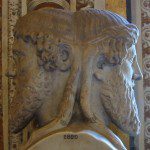So if scientists ask for the definitive evidence of God's existence and activity in the world, the answer, which they will not accept as long as they have in mind one layer in which science replaces theology, is that scientific methods are simply not supposed to find such evidence. The implication is that scientists remain blind to meanings and values as long as their work is taken to be the ultimate explanation of all phenomena, and theologians rob religion of truth when God is forced as an explanation for areas in which scientific research is growing.
So what theological position is left that is able to avoid contradiction with science by making affirmations on its own level? Haught makes four claims on behalf of what he names a "theology of evolution" (73). First, life has always been increasing in complexity carrying with it adventure and beauty. Second, the existence of such novelty frees nature from static lifelessness and determinism. Third, God urges the novel advances of nature through love, a love revealed in Jesus, rather than by force. And fourth, the minimal purpose of this drama is the increase in beauty and complexity throughout the entire process. In other words, once theologically attuned to the drama of life, Christians should focus on the contingency, continuity, and time underlying reality rather than promoting theological battles against scientific explanations of design, diversity, and descent. Scientifically, these latter three features of life result from natural processes and random chance. But understood dramatically and theologically, such contingent features are part of a continuous story in which meaning in relation to God that is still unfolding can be found.
What should be even more attractive for those worried by this proposal is that Haught understands the God allowing such drama to be more biblical than a detached perfect designer. The God luring this drama forward has not provided a specific direction with one predetermined conclusion, but the drama is nonetheless unfolding toward God. "God's ultimate relation with the world is before all else one of liberation and promise rather than the imposition of design" (64). Regardless of science, such a focus should have always been present in Christianity.
While I appreciate Haught's attempt to engage a wide audience with biological science and theological resources that demonstrate how Christianity can avoid conflict with that science, some problems remain in need of clarification. It can be hard to determine whether Haught believes his theological language is necessary given current facts about reality or whether it serves as a strategy for weaseling theological claims into a place science cannot reach. I am not convinced his language is the former and thus remain unsure that Haught is not promoting an independence model for relating science and religion despite his insistence to the contrary. If science was never meant to provide ultimate explanations and theology was never meant to impact scientific claims, then the disciplines really seem to be unrelated and this book's conclusion could have been reached by analyzing what theology should focus on independent of any treatment of biology. The problem of adopting such a model in relation to science is as follows.
How can there be different layers containing different non-contradictory truths? Presumably it is because the layers are independent of each other. If so, Making Sense of Evolution would not be a proposal for dialogue between science and religion but an anti-dialogue proposal suggesting they should keep their hands off each other. However, resources for a give and take between layers seem to be lying dormant in Haught's approach. Doesn't the mere fact that Haught took biological science as an indication that God must be the depth of reality's unfolding drama rather than the meddling designer that intervenes in creation indicate a stronger connection between layers? Or take his writing analogy. Just as an author's means of getting any message across will be limited by the nature of print media, the ultimate divine activity at the depths of reality could have its mode of operation limited by the world to which it is the depth. But I see no explicit exchange of content present in Haught's thought as it currently stands. My fear is that because scientific understandings of reality ranging from the emergence of complex life to the quantum entanglement of all reality mark every instance of reality we know including our own bodies, the lack of more explicit statements about possible lines of exchange between layers makes it feel like any reality not interacting with the scientific level is cut off from us permanently.
Presumably highly educated Christian philosophers and theologians can find comfort in this ultimate layer that does not seem to be readily acknowledged as public fact outside their circles. What of those who are not so astute? Are they left to walk off a cliff and hope Haught is right about support being there? Surely more immediate assurance is available for comprehension by every person than the distant hope of a conclusion to an unfolding drama if Christianity contains any truths that matter here and now.




